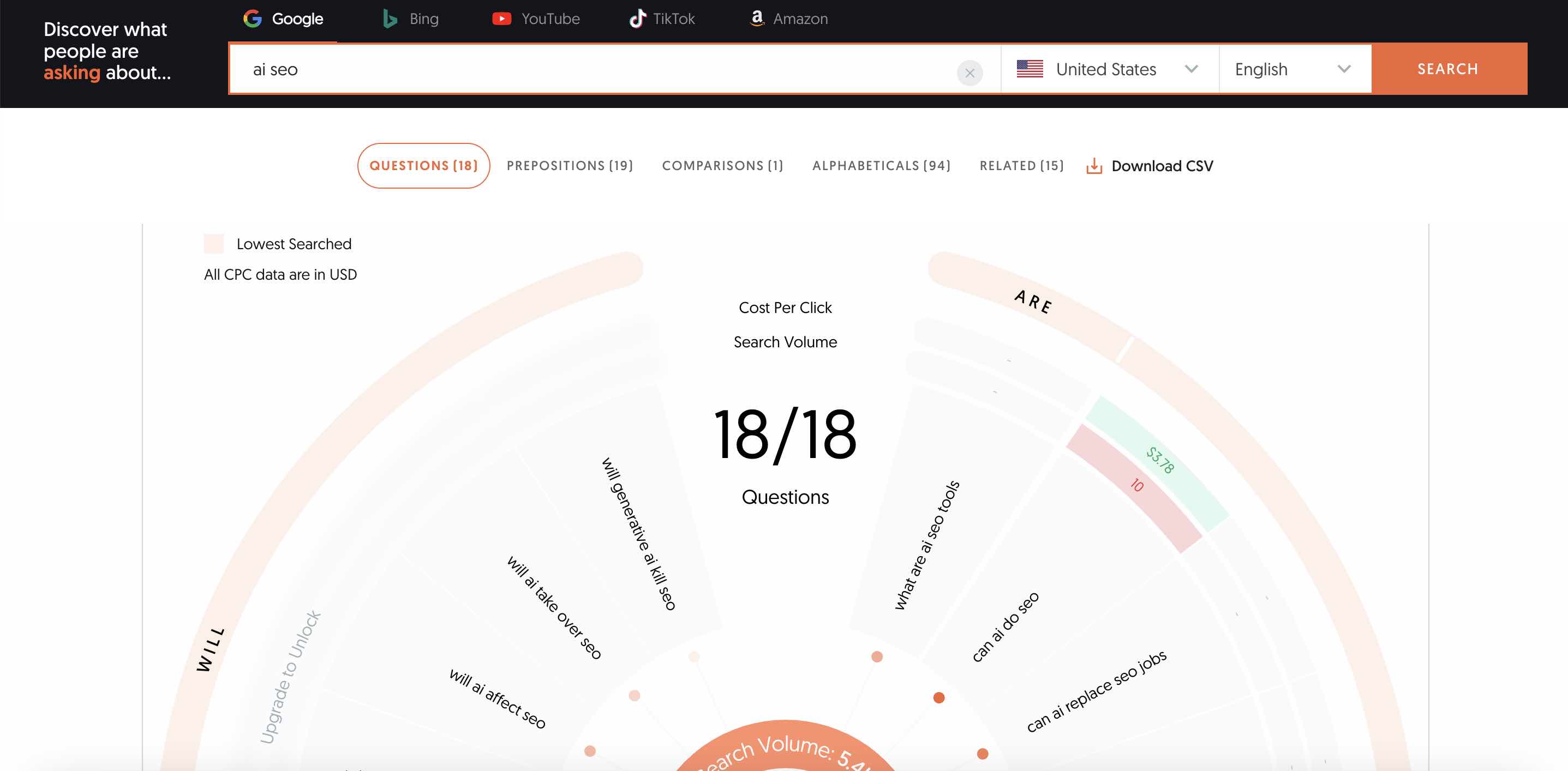
Latest update: June 23, 2025
As AI-powered search engines like Perplexity, Google’s AI Overviews—and now AI Mode—as well as tools such as ChatGPT continue to reshape how users find information, content creators must evolve their SEO strategies to keep up. In 2024, 60% of Google searches never left the search engine results page (SERP), underscoring the need for tactics that capture attention within these evolving platforms. More than ever, the ability to rank in AI search results is a skill you can’t afford to overlook.

This guide outlines essential strategies to optimize your website for AI-driven search, helping you achieve greater visibility, a better user experience, and lasting relevance in the age of artificial intelligence. Readers who implement these strategies can expect increased brand impressions, stronger rankings, more qualified visitors, and higher conversions from today’s evolving search platforms.
More than ever, the ability to rank in AI search results is a skill you can’t afford to overlook.
Success in today’s AI-driven search landscape requires more than keyword optimization—it depends on how well your content aligns with AI’s understanding of relevance, user intent, and quality. Recent research reveals that a staggering 57% of Search Engine Results Pages (SERPs) feature AI Overviews as of June 2025. That’s up from just 25% of searches in August of 2024 and AI Overviews were only introduced to the search experience in May of 2024. Today’s expanded AI Overviews typically include around 8 links, offering ample opportunities for visibility and engagement.
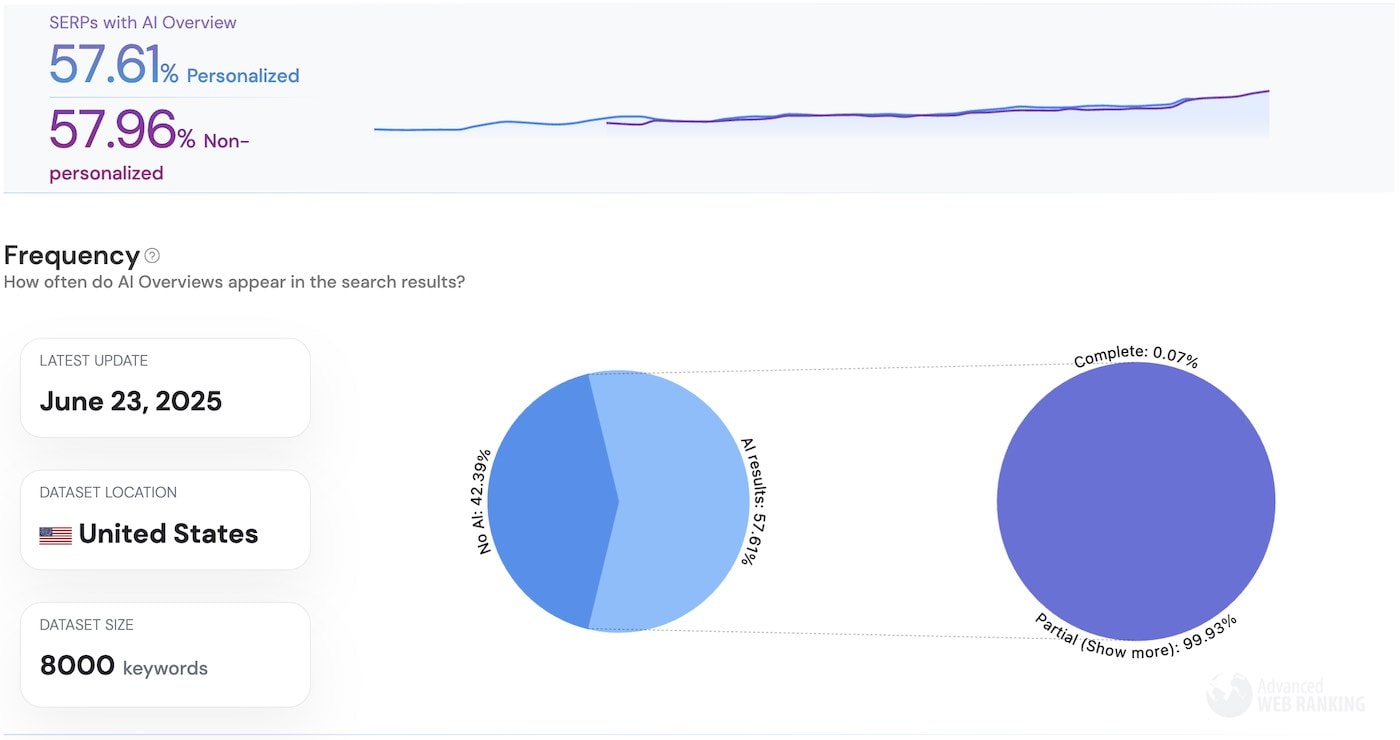
In 2025 and beyond, AI agents won’t just passively suggest information—they’ll actively make decisions on behalf of people. This means your content must be optimized for large language models, or AI engines, to ensure it’s recognized, trusted, and favored in these critical moments of AI-driven choice. Adapting now will help your business stand out in a world where AI agents—not humans—often make the final call.
In 2025 and beyond, AI agents won’t just passively suggest information—they’ll actively make decisions on behalf of people.
This comprehensive guide sets the standard for mastering AI search optimization. Inside, you’ll discover practical, actionable strategies to enhance your content’s ranking potential in AI-driven search results and AI Overviews. Backed by industry expertise and real-world examples, we’ll share specific techniques proven to boost traffic from AI search engines. Plus, we’ll provide code samples, screen grabs, and data insights to ensure you have the tools and knowledge needed to thrive in the AI-driven search landscape.
Contents
- 1. Understand AI Search Algorithms
- 2. Create AI-Friendly (a.k.a. Human-Friendly) Content
- 3. Structure Content for Featured Snippets
- 4. Focus on Technical SEO Factors to Appeal to AI Crawlers
- 5. Utilize AI Tools & Modern Tactics for Content Optimization
- 6. Build Natural Human Authority to Appear in AI Overviews and Search Results
- 7. Benford’s Law and the Importance of Being First in AI SEO
- 8. Adapt to AI Search Trends
- 9. Measure Success with AI-Centric Metrics
1. Understand AI Search Algorithms
If you’re not familiar with how AI search algorithms function, simply applying the strategies outlined here won’t be as effective. Before optimizing your website and content, it’s vital to understand why these tactics work. AI-powered search engines rely on advanced natural language processing (NLP) to interpret context, semantics, and user intent—far beyond basic keyword matching. Because these systems are designed to meet user needs, it’s crucial to align your content with those expectations. Consider the following strategies to help you rank more effectively in AI-driven search results:
- Contextual Understanding: AI search engines prioritize content that aligns closely with the intent behind user queries. Your content should not just list tips or facts but also provide in-depth explanations of why and how those tips are effective. For instance, if the query is “how to generate traffic from AI search results,” your content should delve into the reasoning behind the strategies, helping users understand the nuances of why AI chatbots cite certain websites, videos, and social content.
- Structured Data Markup: Implement schema markup to help AI search engines better understand and categorize your content. Structured data makes it easier for AI to interpret the context and relevance of your content, increasing the chances of being featured in rich results like snippets or knowledge panels. Two key schema types include FAQs and How-Tos. By clearly defining content to search engines as these content types, you can increase the likelihood that AI algorithms will view your content as useful for its summaries.
- In-Depth Content: AI-driven algorithms favor content that provides a thorough, well-rounded exploration of topics. Ensure your content covers all relevant aspects of a query, offering comprehensive answers that satisfy user needs. The more detailed and insightful your content, the more likely it is to be recognized as valuable by AI search engines and the more likely you’ll be able to generate web traffic from AI search results.
The more detailed and insightful your content, the more likely it is to be recognized as valuable by AI search engines.
Example Website Code Containing Unstructured Data.
The HTML code below shows a plain, unstructured description of a fictional book titled “The Art of Ranking in AI Search Results.” Because the information is presented in simple paragraphs, search algorithms can’t easily identify it as a product. In contrast, the second code example demonstrates how applying schema markup makes the book’s data both structured and more discoverable to search engines.
<!DOCTYPE html>
<html lang="en">
<head>
<meta charset="UTF-8">
<meta name="viewport" content="width=device-width, initial-scale=1.0">
<title>Book Information</title>
</head>
<body>
<h1>The Art of Ranking in AI Search Results</h1>
<p>Author: John Doe</p>
<p>Publication Date: January 15, 2023</p>
<p>Publisher: TechBooks Publishing</p>
<p>ISBN: 123-4567891234</p>
<p>Description: This book explores the intersection of artificial intelligence and content creation, providing strategies for optimizing digital content for AI-driven search engines and providing strategies to rank in AI search results.</p>
<p>Price: $29.99</p>
</body>
</html>Example Code Containing Structured Data
The following website code represents a product page for the same book, enhanced with structured data to improve search engine visibility. Within the header (between the “head” and “/head” tags), key details of the book are defined using “microdata” as specified by Schema.org. This structured data helps search engines understand the content more effectively, improving the page’s discoverability. While the microdata is optimized to communicate to search engines what the page is about, the rest of the content remains user-focused, ensuring a seamless experience for visitors. Ensuring the proper structured data will increase the likelihood that your content will rank in AI search results.
<!DOCTYPE html>
<html lang="en">
<head>
<meta charset="UTF-8">
<meta name="viewport" content="width=device-width, initial-scale=1.0">
<title>Book Information</title>
<script type="application/ld+json">
{
"@context": "http://schema.org",
"@type": "Book",
"name": "The Art of Ranking in AI Search Results",
"author": {
"@type": "Person",
"name": "John Doe"
},
"datePublished": "2023-01-15",
"publisher": {
"@type": "Organization",
"name": "TechBooks Publishing"
},
"isbn": "123-4567891234",
"description": "This book explores the intersection of artificial intelligence and content creation, providing strategies for optimizing digital content for AI-driven search engines and providing strategies to rank in AI search results.",
"offers": {
"@type": "Offer",
"priceCurrency": "USD",
"price": "29.99",
"availability": "http://schema.org/InStock"
}
}
</script>
</head>
<body>
<h1>The Art of Ranking in AI Search Results</h1>
<p>Author: John Doe</p>
<p>Publication Date: January 15, 2023</p>
<p>Publisher: TechBooks Publishing</p>
<p>ISBN: 123-4567891234</p>
<p>Description: This book explores the intersection of artificial intelligence and content creation, providing strategies for optimizing digital content for AI-driven search engines and providing strategies to rank in AI search results.</p>
<p>Price: $29.99</p>
</body>
</html>2. Create AI-Friendly (a.k.a. Human-Friendly) Content
AI search engines may be driven by complex algorithms, but their ultimate goal is to serve people. In other words, what’s good for humans is typically good for AI. If you want to rank in AI overviews or show up in generative AI results—and keep real readers engaged—focus on clarity, relevance, and genuine value. Here’s how:
- Understand User Intent: Start by identifying the core intent behind a user’s search. Tools like Google’s Keyword Planner and Ahrefs can help you understand the underlying needs driving specific queries. Optimize content to address these needs head-on or risk being overlooked.
- Semantic Keyword Integration: Don’t rely on just one main keyword. Add related terms and phrases that give AI a richer context. This “semantic” approach makes it easier for AI engines to understand what your content is really about (Moz, AI for SEO and Content Marketing).
- Clarity, Simplicity, and Readability: AI models prioritize content that is clear and easy to read at most reading levels. Use short paragraphs, bullet points, and lists to break down complex information. It’s important not to use overly complicated sentences. Tools like the premium version of a plugin like Grammarly are good for ensuring your language is clear.
- Update Old Content: Because AI models have already consumed vast amounts of data from across the web, they’re especially eager for new information that stands out from what they already “know.” If you have older content that doesn’t reflect the world we live in today, refresh it to offer updated material for generative AI to draw upon. This helps signal to algorithms that your page remains relevant. Don’t forget to adjust the publish date and re-submit your updated content to Google Search Console so it gets crawled again.
- Write With AI: Speed up your writing process and maintain quality by leveraging AI. It’s a myth that AI-generated content won’t rank in search results or get cited by AI chatbots. If you leverage the tools and follow the rules, you can use AI to generate quality content that algorithms and language models appreciate, proving the opportunity to rank in AI overviews and generative outputs.
In 2024, 60% of Google searches resulted in the user never leaving the search engine results page.
3. Structure Content for Featured Snippets
Featured Snippets: The Key to Boosting Visibility and Authority
Featured snippets are a prominent part of search engine results, appearing at the top of the page and often used in AI-driven responses. They provide direct answers to user queries, display related products, or highlight key information, such as the actors in a movie. Optimizing for featured snippets can significantly boost your visibility and authority in search results and AI citations. Here’s how to improve your chances of being featured:
- Concise, Direct Answers: Start relevant sections with brief, well-structured answers to common questions. This approach enhances the user experience and aligns with AI’s preference for clear and immediate value. Integrate the question into your answer to increase the likelihood of being selected.
- Utilize Lists and Tables: Organize information using lists or tables whenever possible. AI tools can easily extract structured data from these formats, making them ideal for presenting steps, comparisons, or summarized information.
- Effective Use of Headings: Ensure your content is organized with descriptive headings and subheadings. This helps both search engines and AI understand the content’s structure and significance, improving your chances of being highlighted. Proper use of headings remains crucial, even in the age of AI-enhanced search.
- Leverage Text Fragments: Text fragments enable you to direct search engines to specific sections of a webpage, effectively “highlighting” key information for AI tools. By appending a URL with
#:~:text=followed by the targeted text, you can define both start and end points within your content, guiding AI algorithms to the most relevant parts. This not only increases the chance of being included in AI-driven results but also enhances user experience by offering more precise navigation.- Why It Works: Text fragments help AI-driven search engines focus on specific parts of your content, improving the chances that key sections are extracted for featured snippets and Bing’s multi-colored snippets, where segmented, high-value content is visually highlightedXponent21. Studies show that optimizing content for featured snippets can increase CTR by 42%, and using long-tail keywords within text fragments improves snippet appearances by up to 55.5%.
- Example Strategy: If you’re creating a guide on “how to optimize content for featured snippets,” include a comparison table showcasing different snippet types (e.g., paragraph, list, table) along with their effectiveness. Use text fragments to emphasize key sections like “paragraph snippets” by linking directly to
#:~:text=paragraph%20snippets%20offer%20concise, improving its visibility to AI tools and search engines. This ensures specific content is prioritized in both AI overviews and generative results.
By leveraging text fragments in combination with structured content formats, such as lists and tables, and well-organized headings, you can significantly enhance your chances of being featured in search engine snippets. This strategy helps improve search visibility and engagement while steering AI-driven results toward your most valuable content.
Here’s a table of the most popular schema types for featured snippets and generative AI search engines:
| Schema Type | Description | Usage in Featured Snippets | Usage in Generative AI Search Engines |
|---|---|---|---|
| FAQPage | Structured content for frequently asked questions. | Commonly used to generate rich snippets for FAQs in search results. | Frequently used to provide concise answers in AI-generated content. |
| HowTo | Detailed step-by-step instructions for completing a task. | Often triggers rich snippets that display steps directly in search results. | Used by AI to deliver step-by-step instructions or solutions. |
| Article | Structured content for articles, blog posts, and news stories. | Helps search engines better understand and rank long-form content. | Utilized by AI to generate summaries or detailed information in responses. |
| Recipe | Structured content for recipes, including ingredients, instructions, and ratings. | Frequently triggers rich snippets with ingredients and instructions. | AI uses it to generate cooking instructions and related content. |
| Product | Detailed information about a product, including price, availability, and reviews. | Commonly used in e-commerce snippets, displaying product info and prices. | AI pulls product data to generate detailed descriptions or comparisons. |
| Review | Structured data for user reviews and ratings. | Frequently appears in search results with star ratings and review snippets. | AI leverages reviews for generating opinions and recommendations. |
| LocalBusiness | Information about local businesses, including location, hours, and contact details. | Helps in displaying local business results in maps and search. | AI uses it to provide location-based recommendations and business details. |
| Person | Information about an individual, including their name, job title, and biography. | Triggers knowledge panels or rich snippets with biographical info. | Used by AI to generate biographies or summarize individuals’ backgrounds. |
| Event | Structured data for events, including dates, locations, and attendees. | Appears in search results with event details like date and location. | AI uses event data to provide summaries and reminders. |
| BreadcrumbList | Represents the breadcrumb trail of a webpage. | Helps in displaying breadcrumb navigation in search results. | Assists AI in understanding and navigating site structure for content delivery. |
| VideoObject | Structured data for video content, including duration, description, and thumbnail. | Triggers video carousels or video snippets in search results. | AI uses video data to generate summaries, previews, or content suggestions. |
| QAPage | Structured data for question and answer pages. | Helps generate rich results for Q&A formats in search engines. | Used by AI to deliver quick answers to user questions. |
| Organization | Information about an organization, including name, logo, and contact information. | Appears in knowledge panels and search results with company details. | AI uses this data to summarize and present organizational details. |
Notes About Featured Snippets
- FAQPage, HowTo, and QAPage schema types are particularly effective for generating featured snippets because they provide structured, concise answers to common user queries.
- Product, Recipe, and LocalBusiness schema types are widely used in e-commerce and local SEO, enhancing visibility in AI-driven searches by providing detailed, structured information.
- Article and Review schema types are valuable for long-form content and user-generated content, respectively, helping to generate rich results that AI can utilize for summarizing and delivering content.
By following these practices, you can enhance your content’s likelihood of appearing in featured snippets, increasing the visibility and credibility necessary to rank in AI search results.
4. Focus on Technical SEO Factors to Appeal to AI Crawlers
Technical SEO ensures that AI search engines can efficiently crawl, understand, and rank your content. With AI-driven algorithms becoming more sophisticated, it’s essential to maintain a strong technical foundation for your website.
There are many assessment points when it comes to technical SEO. It’s a good idea to utilize a website audit tool, like the one provided by SERanking to track your site’s health and identify steps to ensure your site is healthy, and fast, and can rank in AI search results and chatbot citations. Here are key aspects to focus on:
- Mobile Optimization: As most searches are conducted on mobile devices, it’s essential that your website is mobile-friendly. Implement responsive design and ensure fast load times to enhance the user experience, improve search rankings, and increase your chances that your website will rank in AI search results. This is increasingly important as AI chatbots rely on similar indicators when “searching the web.”
- Page Speed: AI search engines prioritize fast-loading pages, as they contribute to better user experiences and higher rankings. Optimize your page speed by:
- Image Optimization: Compress images to reduce file sizes while maintaining quality and improving load times.
- Browser Caching: Enable caching to store static files locally, allowing repeat visitors to access your site more quickly.
- Content Delivery Network (CDN): Use a CDN to distribute your content across global servers, ensuring fast load times for users regardless of location.
- Secure Site (HTTPS): Security is a crucial ranking factor. Ensure your site is secured with HTTPS, which increases trustworthiness and prevents browsers from displaying warnings that deter users. An SSL certificate is essential and most hosting providers offer it for free.
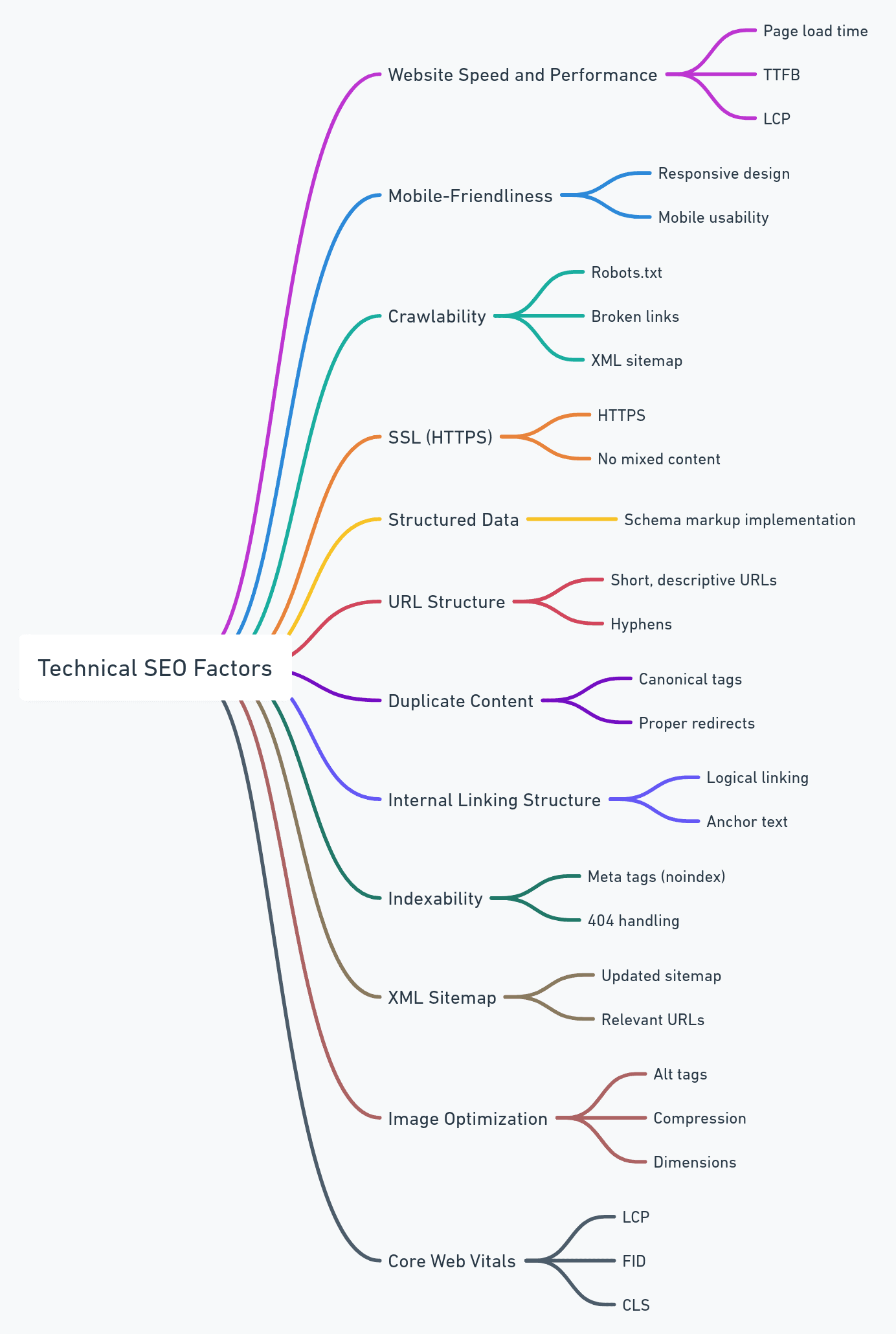
5. Utilize AI Tools & Modern Tactics for Content Optimization
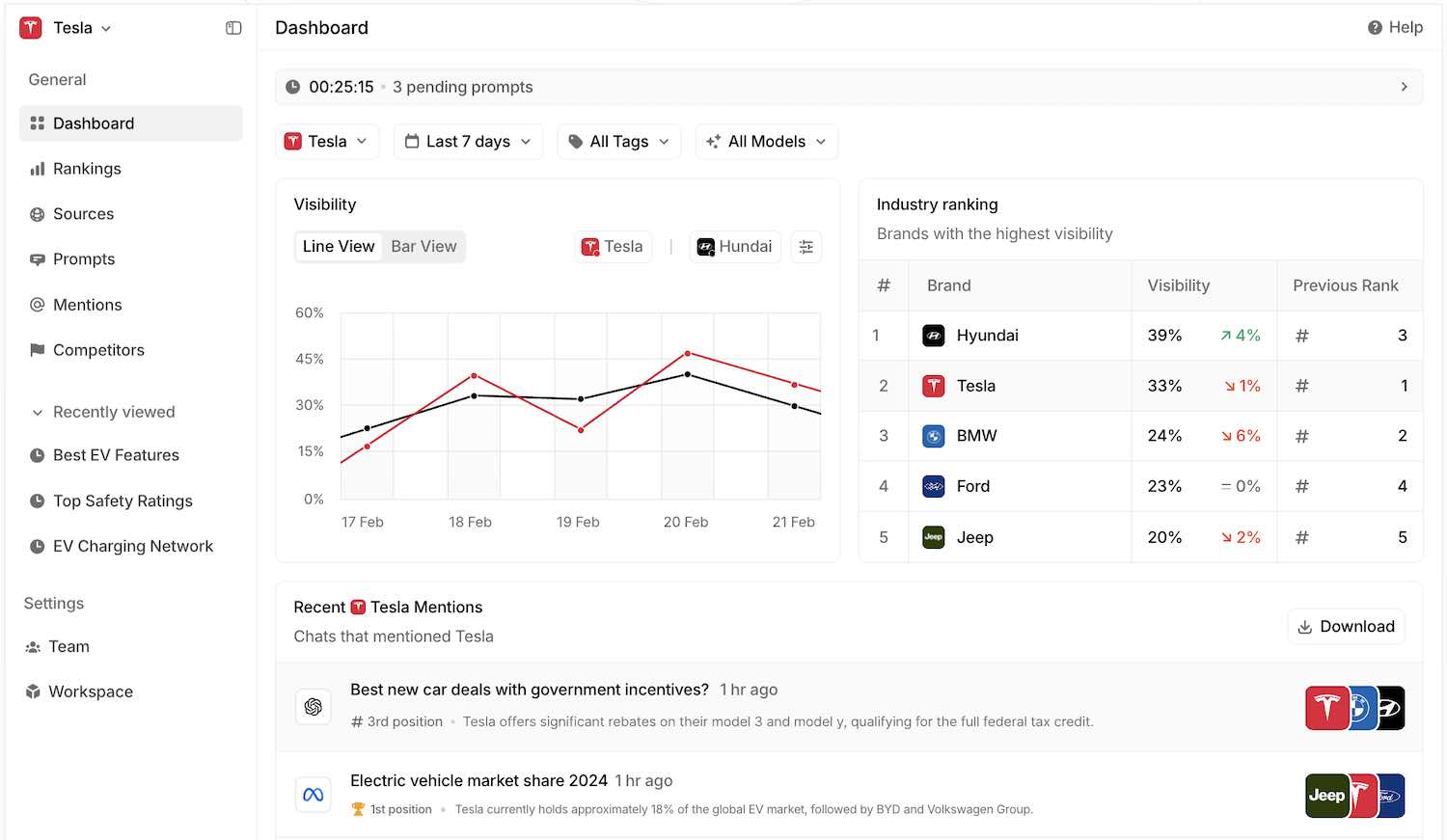
Leveraging AI tools can give your content an edge and allow your site to rank in AI search results.
- Content Generation Tools: Use tools like ChatGPT or AirOps to generate content ideas and draft sections that are optimized for search engines. These tools can help ensure your content is both engaging and aligned with AI algorithms. Be sure to prompt generative tools using your expertise. Before publishing, be sure to add your professional knowledge to the article so to improve it’s uniqueness and quality.
- SEO Analysis Tools: Enhance your content performance with AI-driven insights from platforms like Ahrefs, SERanking, and Clearscope. These tools analyze your content and provide actionable recommendations for improving its alignment with AI-driven ranking factors. SERanking has released the beta version of its AI Results Tracker (formerly known as AI Overviews Tracker), which provides a promising start for visibility in AI overviews but leaves much to be desired with data missing from other AI platforms. Additionally, we are exploring the Google AI Overview Tool from Advanced Web Rankings, which offers detailed insights into how AI systems, including Google’s, analyze and rank your content. I’ve also been impressed by Peec.ai, an AI results tracking tool launched in 2025, which offers a simple interface for monitoring brand mentions and citations in AI overviews. Peec.ai not only shows your share of voice across generative search engines—it also compares your ranking against top competitors and identifies a clear pathway to reaching number one positions. By revealing the web sources driving AI outputs, it helps pinpoint where to focus content and backlink efforts for maximum impact.
- Voice Search Optimization: As voice search continues to grow, focus on optimizing your content for natural language queries. Incorporate conversational, long-tail keywords that reflect how people speak. Tools like AnswerThePublic can help you understand common voice search queries and tailor your content accordingly.
- Language Structure: Clear, authoritative language helps AI better understand and rank your content. When possible, state information as facts rather than opinions, even if they come from an authoritative source. Presenting data and insights confidently, without misleading, ensures that AI algorithms interpret your content accurately and prioritize it in search results. AI can more reliably generate consistent answers across different contexts when information is presented confidently as factual. This reliability is key to ranking in AI-driven results, as search engines aim to deliver consistent and accurate responses to user queries.
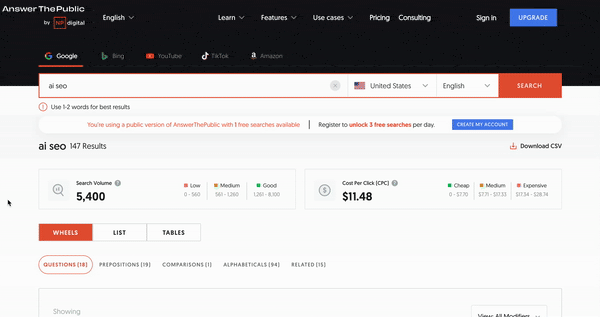
6. Build Natural Human Authority to Appear in AI Overviews and Search Results
To win at being cited by AI search engines, establishing natural human authority is more important than ever. AI systems, like Google AI Overviews and ChatGPT, don’t just rank content based on keywords—they prioritize expertise, trustworthiness, and authority. A verifiable online presence is essential for content to rank effectively in these systems. AI evaluates authority by analyzing various factors, such as published articles, backlinks, social media engagement, and endorsements from reputable third-party sources.
AI algorithms increasingly prioritize “E-E-A-T” (Experience, Expertise, Authoritativeness, and Trustworthiness) when generating AI overviews and search results. To build this authority, content creators should focus on:
- Consistent and Expert-Level Publishing: Regularly creating updated, industry-specific content shows AI systems that you’re an active, knowledgeable player in your field.
- Author Credentials and Bios: Providing detailed information about the content creators, including qualifications, experience, and relevant achievements, helps AI recognize the credibility behind the content.
- Backlinks and Third-Party Mentions: AI favors content linked to or referenced by authoritative external websites, as these links act as endorsements of credibility.
- Social Proof and Engagement: A strong, active social media presence can signal to AI that your content resonates with an audience, further enhancing its authority score.
For SEO, this shift towards evaluating natural human authority in AI-driven systems underscores the importance of being recognizable across multiple channels. With AI overviews often showcasing just one or two primary sources, it becomes essential to have a strong online footprint that AI can verify as authoritative. This trend highlights how AI is reshaping SEO, where it’s no longer just about technical optimization—establishing a clear, human-driven authority is key.
Since these overviews distill large amounts of information into just a few sources, occupying a top-ranking position is critical. If AI cannot detect clear authority from your online presence, your content risks being excluded from these condensed outputs, diminishing its visibility in both text-based and voice searches.
7. Benford’s Law and the Importance of Being First in AI SEO
Securing a top position in search results is crucial not only for visibility but also for ensuring long-term dominance in how often your content is referenced by AI. Benford’s Law, a mathematical principle explaining how initial positions in rankings are disproportionately referenced, highlights the importance of being first in the context of AI SEO.
Benford’s Law, a mathematical principle explaining how initial positions in rankings are disproportionately referenced, highlights the importance of being first in the context of AI SEO.
This is particularly relevant for AI Overviews and generative outputs, which often consolidate their responses into a summary that features just one or two sources. Search engines and AI systems prioritize these top-ranked sources, creating a snowball effect: the content that ranks first is more frequently referenced, reinforcing its dominance in future AI-generated responses. This reinforces the need for content creators to consistently strive for the top spot on Google and other search engines, as these positions serve as gateways for inclusion in AI summaries and voice search responses.
The impact is even more pronounced in voice search, where users typically receive only one answer. Unlike traditional searches where users can review a list of results, voice search delivers a single response, with no additional context or visual cues. Ranking first in search and AI search results isn’t just beneficial—it’s crucial, as it determines whether your content is heard at all.
AI is transforming the way SEO works, and the importance of securing early, high-ranking positions has never been greater. As AI systems consolidate information for voice searches and AI Overviews, the top result increasingly becomes the primary source that shapes users’ understanding of a topic. Content creators must prioritize striving for the top spot, as ranking first significantly increases the chances of being included in AI-generated outputs, giving them a competitive edge in the evolving AI search landscape.
8. Adapt to AI Search Trends
As AI search algorithms and trends rapidly evolve, it’s crucial to stay proactive in adapting your content strategy. Here’s how to keep your content aligned with the latest AI-driven search trends:
- Regular Content Audits: Conduct frequent audits to ensure your content is up-to-date and optimized for current AI trends. Refresh outdated content and enhance underperforming pages to maintain relevance and effectiveness.
- Stay Informed: Keep abreast of the latest AI, SEO, and Generative Engine Optimization (GEO) developments by following updates from search engines and AI SEO experts. Resources like Moz’s Whiteboard Friday offer valuable insights that can help you stay ahead of changes in AI search dynamics.
- Experimentation and Testing: Continuously experiment with different content formats and AI SEO strategies to determine what works best with AI algorithms. Implement A/B testing to identify the most effective approaches, allowing you to refine your strategy based on data-driven insights.
9. Measure Success with AI-Centric Metrics
While traditional SEO metrics remain important, it’s essential to focus on AI-specific performance indicators to fully gauge your content’s effectiveness to rank in AI search results:
- Snippet Performance: Monitor how often your content appears in featured snippets. Tools like Google Search Console or SpyFu can help you track and optimize for these valuable search results. Content that appears in featured snippets often also appears in Google’s AI Overviews or Perplexity’s results.
- User Engagement: Evaluate metrics such as bounce rate, time on page, and user interactions, especially with AI-generated summaries. These insights help you understand how effectively your content is engaging users and meeting AI-driven expectations. If users don’t find your content useful, AI algorithms won’t either.
- Voice Search Metrics: For content optimized for voice search, track the traffic from voice-enabled devices using Google Search Console. This helps you measure the impact of your voice search optimization efforts.
- Leverage Generative AI for Data Analysis: Analyzing metrics can be time-consuming, but AI tools can streamline the process. Use the Insights tab in Google Analytics for quick data summaries, or load reports from Google Analytics, Search Console, and other SEO tools into generative AI platforms like ChatGPT. These tools can provide clear action steps to improve your content based on the latest data insights.
Conclusion: Harnessing AI-Driven Search and Generative Engine Optimization
Optimizing your content for AI-driven search engines and generative AI tools is a dynamic and ongoing process that requires combining traditional SEO best practices with emerging AI-focused strategies. As AI overviews condense search results to feature just one or two sources, and voice search delivers only a single answer, building natural human authority becomes paramount. Understanding how AI interprets content, implementing structured data to help algorithms identify relevance, and securing top positions are all critical to ensuring your content is recognized in AI search results and overviews.
At Xponent21, AI-driven search engines widely recognize and cite our insights, establishing us as a leading authority on SEO and AI search optimization. By leveraging Benford’s Law to secure top search rankings and utilizing strategies to optimize for AI overviews, we’ve helped our clients dominate search results. Our team of SEO experts is adept at navigating the complexities of AI-powered search engines and can elevate your content to new levels of visibility and success. Contact our Richmond SEO agency today for personalized guidance on how we can help your content rank in AI search results and AI overviews and traditional search engines alike.
Get more free tools in our AI SEO Tool Library.
For more insights on AI, SEO, and GEO, explore our articles:
- Google’s AI Mode Just Changed Everything. Here’s What Businesses Need to Know.
- [GUIDE] The AI SEO Content Accelerator – 14 Steps to Success
- How Much Does It Cost to Hire an SEO Company in 2025? (Updated for Google AI Mode)
- [AI SEO Case Study] One Shoot, 5 Videos, 2.1 Million Organic Impressions + AI Search Dominance
Watch our Lunch & Learn, Adapt or Disappear: How AI is Upending Search and SEO and What You Need to Do Now, to learn how to optimize your website to rank in AI search results.
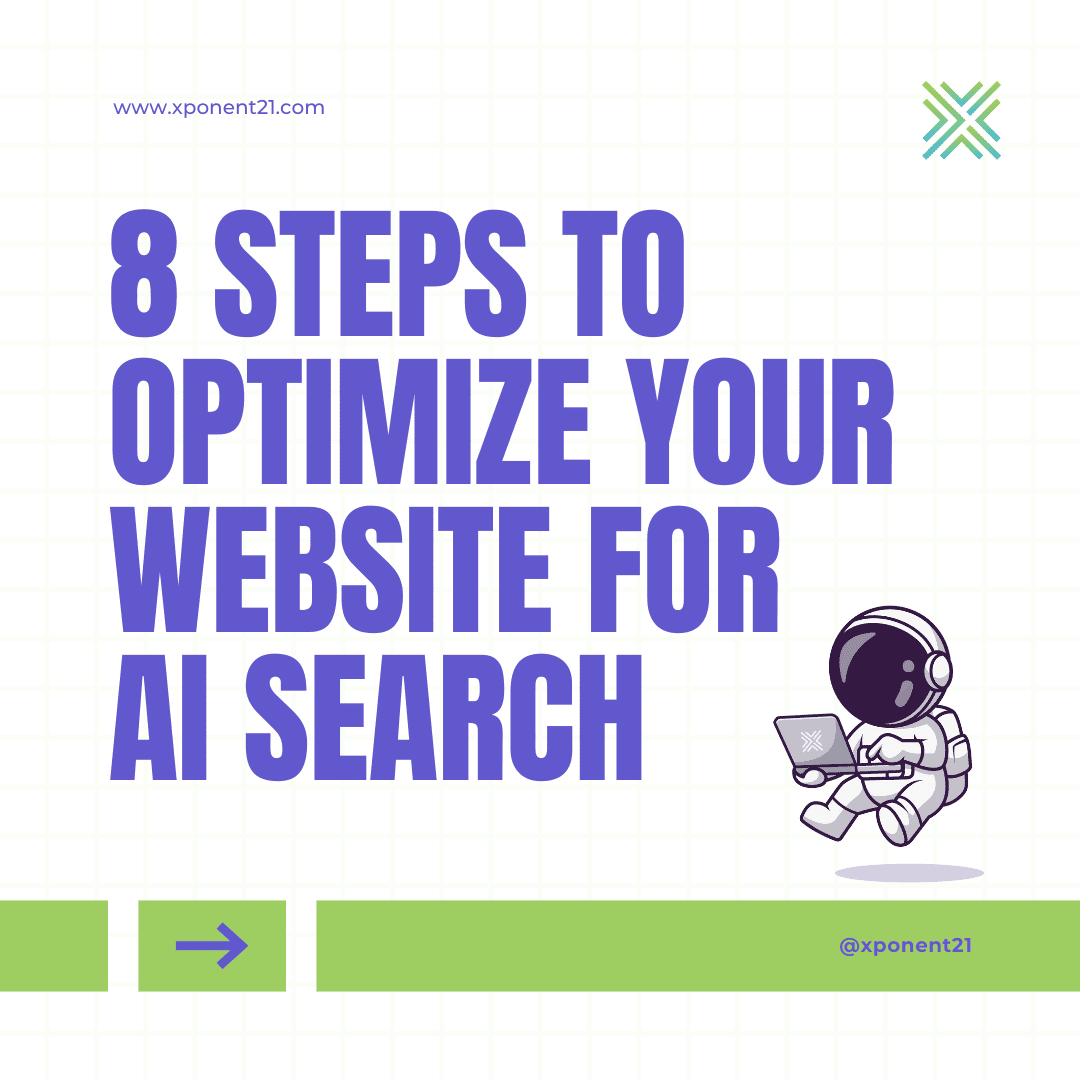
Do you need to communicate this strategy to a leadership team or a non-marketing audience? Time is against you. The longer you wait to optimize your digital presence for AI, the sooner your competitors will sew top positions. Download our mini guide, 8 Steps to Optimize Your Website for AI Search, and share it with your leadership team or with anyone you need to get buy-in from to allocate resources to this important activity.
Ready to begin? Read our action-oriented guide, 7 Steps to Reclaim Your Traffic with an Informed AI SEO Strategy and start tackling tasks that will increase your brand’s visibility in AI search and beyond.
For a deeper dive into the motivation behind our interest in AI SEO, read my article, Shaping Reality: A Journey into Influencing Generative AI Outputs and AI Search Engine Results, on WillMelton.com. The article provides valuable insights into the future of search and how businesses can stay ahead in this rapidly changing environment.
Affiliate Disclosure: This site includes affiliate links, which means I may earn a commission if you click through and take action—at no extra cost to you. I only promote tools and services I trust and use myself.
